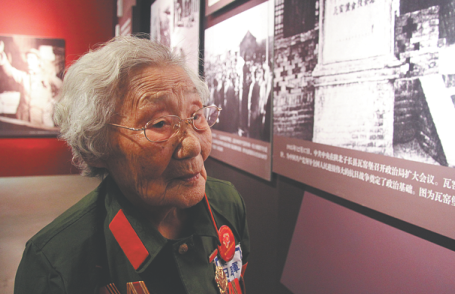Honoring a hidden army
By Wang Ru (China Daily) Updated: 2015-09-03 07:56
 |
|
Li Zaide, a 98-year-old guerrilla veteran, joined the fight against the Japanese in Northeast China in 1932. WANG RU/CHINA DAILY |
Crossing the border
Recently, Li has been watching the squares formed by female soldiers during the rehearsals for the Sept 3 parade that will mark the 70th anniversary of the end of World War II and China's victory in the Chinese People's War of Resistance against Japanese Aggression (1937-45).
She said the women reminded her of female pioneers, such as her mother and Pei, who fought and died in the forests and were buried in the frozen soil more than 70 years ago.
In 1936, guerrilla units in different parts in Northeast China were reorganized to form the Northeast Anti-Japanese United Army, also known as NAJUA.
Li married in 1937, and in 1938, along with her unit and husband, she was sent across the border into what was then the Soviet Union, where she was taught radio communications techniques by the Soviet army. In 1939, she returned to China to join the NAJUA Third Army, commanded by General Zhao Shangzhi, who died as a prisoner of the Kempeitai, the Japanese military police, in 1942.
"General Zhao looked like an ordinary soldier instead of the chief commander. He had a glass eye, but his heart wasn't false. He was truly committed to the liberation of the Chinese people," she said.
Li later joined the 88th International Brigade under the command of the Soviets, but composed of Soviet, Chinese and Korean troops. In 1945, the brigade was later incorporated into the Soviet Army's Far-Eastern Front, which was instrumental in Japan's defeat in Northeast China.
A new life
After the founding of the People's Republic of China in 1949, Li became the first Korean to be granted Chinese nationality. She moved to Beijing and began working in the library of the Standing Committee of the National People's Congress. She held the post until her retirement several decades ago.
She still has a battered notebook in which she recorded the names of the dead and injured soldiers from the different guerrilla units, many of whom had fought alongside her.
"It was their spirit of liberation and sacrifice that spurred me to fight against the invasion and work for peace," she said.




